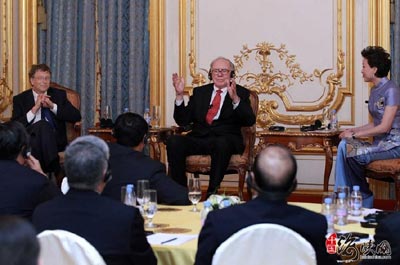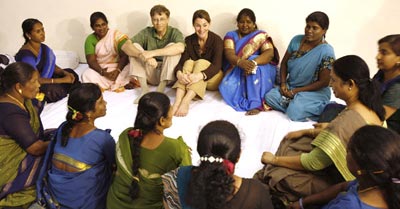數月前,巴菲特和比爾?蓋茨在北京舉辦的一場慈善晚宴掀起了國人對慈善的熱烈討論。人們把此次晚宴當成考驗中國富豪慈善態度的“試金石”。最終,二人并未借助慈善晚會對中國富豪勸捐,但媒體稱“巴比晚宴”開啟了中西慈善對話之門。那么,“巴比”的慈善帝國究竟是何模樣,人們又是怎樣看待它的呢?

范錦林 選編
In June 2010, Bill and Melinda Gates and Warren Buffett started the Giving Pledge: an initiative aimed at getting billionaires to pledge at least half of their net worth to charitable donations.[1] So far, 40 individuals have signed up. The list includes household names like George Lucas, David Rockefeller, Larry Ellison, Michael Bloomberg and,[2] not least, founders Gates and Buffett, who have pledged significantly more than half of their net worth.
The impact of the Giving Pledge is astounding[3]. Let’s look at these numbers and what they mean:
?The combined net worth of pledgers: $230 billion
?What could $230 billion do for the world? Feed more than 862 million hungry people for 7.7 years.
Some billionaires, such as Warren Buffett and Larry Ellison have already pledged far more than half of their wealth.
?Warren Buffett: $46.5 billion
?If Buffett donated $46.5 billion today, it could treat over 1 million people affected with AIDS in Africa per year, for 30 years.
?Larry Ellison: $26.6 billion
?If Larry Ellison donated $26.6 billion today, it could provide laptops[4] for 133 million poor children.
?With Warren Buffett, Larry Ellison and the other billionaires donating more than 50% of their wealth, $125 billion could go to charities today.
?What could $125 billion do for the world? Educate over 80 million children in Africa for 12.5 years, or give cleaning water to 5 billion people for 200 years.
Why are there so many ifs in this breakdown[5]? According to the pledge the donation can happen either during the lifetime or after the death of the donor[6]. And its website, givingpledge.org, says “it is a moral commitment to give, not a legal contract.[7]” So, with the Buffett-Gates pledge, the timing and scope is unclear.
Its real value, as the website indicates, is in the knock-on effect[8]: “While the Giving Pledge is specifically focused on billionaires, the idea takes its inspiration from efforts in the past and at present that encourage and recognize givers of all financial means and backgrounds. We are inspired by the example set by millions of Americans who give generously (and often at great personal sacrifice) to make the world a better place.”
On the website, each billionaire-donor posts a letter explaining their decision to pledge. “During even the Depression’s worst years, my parents gave money— about 8 percent of their annual income of $2,200,” Mr. Lorry I. Lokey[9] wrote. “I remember saying to my mother that we can’t afford that. But she said we have to share with others. I learned from that to share.”
The pledge, however, has been criticized in Germany. “For most people that is too ostentatious,” said one of the billionaires contacted by Gates, adding that many of the people contacted had already donated larger proportions of their assets than the Americans to charitable foundations.[10] Obviously, not everyone wishes to make a public declaration of support, and this most likely includes individuals who have already made substantial[11] gifts to charity.
German millionaires also added that donations by the rich shouldn’t replace duties that would be better carried out by the government. The rich do not have the right to decide where massive sums of money will flow.
Some people who disapprove of the Giving Pledge argue that the very wealthy should devote their money to starting new businesses that will create jobs and new wealth for society rather than pour money into philanthropy.[12] Most of the self-made billionaires are proven business leaders and have the potential to further develop their wealth in business. Relying more on philanthropy is a conservative approach to addressing poverty and human suffering.[13]

The pledge is also a matter of debate in philanthropic circle. To philanthropic institutions, whether the donor could ultimately fulfill a long-term pledge is of high concern.[14] Of course, if you are broke, you probably have more pressing things to worry about than whether your name is taken off of a building.[15] But the impact on the institution itself can vary widely. “Fifty bucks is 50 bucks—if it falls through,[16] it falls through,” said Susan Wolf Ditkoff, a partner at Bridgespan, a nonprofit[17] that helps philanthropic leaders in developing strategies. “But with these large-scale, multiyear pledges, the stakes[18] are much higher. The loss of a $1 million pledge could have a very different outcome. The institution could be really counting on[19] that pledge,” she said.
Seen from a broader perspective, money is not everything; it requires more than money to accomplish what’s listed in the above number-breakdown. $125 billion could only theoretically educate 80 million children in Africa for 12.5 years—if they also have the teachers, and schools, and social infrastructure, and political stability, to support it.[20] A poor country doesn’t just turn X billions into Y educated children: There’s corruption, violence, uncertainty, inefficiency. And, as the Gates Foundation has shown, donating large sums can have the unintended effect of solving one problem while warping a society[21]—if all the money is going into AIDS treatment, doctors may neglect basic health, because they can become a lot richer treating AIDS.
Yet the billionaire pledge speaks volumes[22]. Another point that needs to be kept in mind is philanthropy, and like anything else, it needs a game plan[23].
Vocabulary
1. 2010年6月,比爾?蓋茨和梅琳達?蓋茨夫婦與沃倫?巴菲特啟動了“捐贈宣言”行動,旨在號召億萬富翁們承諾,將起碼半數的凈資產用于慈善捐贈。pledge: 可用作動詞,“(為某一目的)提供(一定數目的錢款)”,也可用作名詞,“承諾(給予某組織)的錢款”,下文的pledger指“承諾捐款者”。
2. household: 家喻戶曉的;句中提到的億萬富翁為:大導演George Lucas、洛克菲勒家族掌門人David Rockefeller、甲骨文公司創始人Larry Ellison和傳媒大亨、紐約市長Michael Bloomberg。
3. astounding: 令人震驚的。
4. laptop: 筆記本電腦。
5. breakdown: 分類,分析。
6. donor: 捐贈人。
7. 捐贈是道德承諾,而非法律契約。
8. knock-on effect: 連鎖效應。
9. Lorry I. Lokey: 新聞稿和信息發布平臺提供商“美國商業資訊”(Business Wire)的創始人,慈善家。
10. ostentatious: 炫耀的,賣弄的;asset: 財產;charitable foundation: 慈善基金會。
11. substantial: 大量的,相當數目的。
12. disapprove of: 不贊同,不喜歡;philanthropy: 慈善(事業),形容詞形式為philanthropic,下文的philanthropic circle指“慈善界”。
13. conservative approach: 保守的方式;address: 解決,應對。
14. ultimately: 最終;be of high concern: 有重要關系。
15. 你要是破產了,當然會憂慮一些更急迫的事情,而不會去考慮自己的名字會不會被從某座建筑物上抹去(捐贈者的名字常出現于其捐款所建的建筑上,故有此語)。
16. buck: 〈美俚〉(一)美元;fall through: 不能踐約,成為泡影。
17. nonprofit: 非盈利組織。
18. stake: 賭注,利害關系。
19. count on: 依靠,指望。
20. theoretically: 理論上地;infrastructure: 基礎設施;stability: 穩定。
21. the Gates Foundation: 指比爾和梅琳達?蓋茨基金會;unintended: 非計劃中的;warp: 使變形。
22. speak volumes: 意義重大。
23. game plan:(尤指在體育、政治、商業活動中)事先制定的對策。
(來源:英語學習雜志)